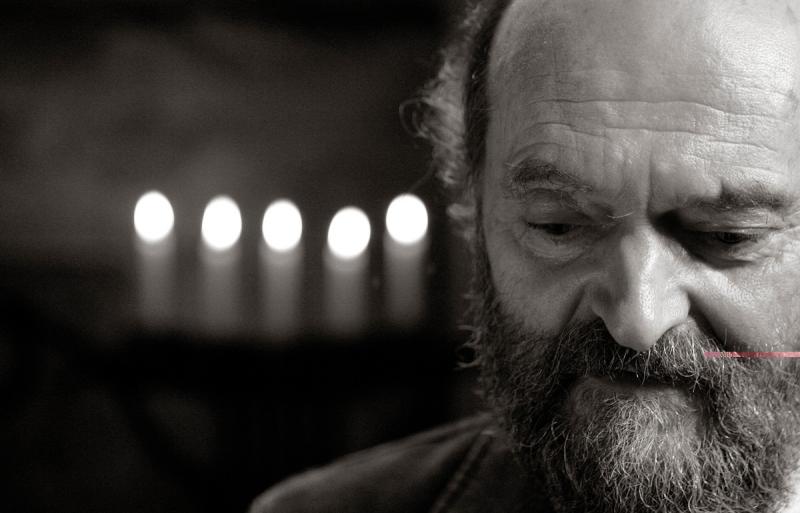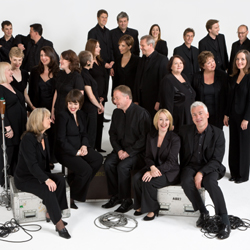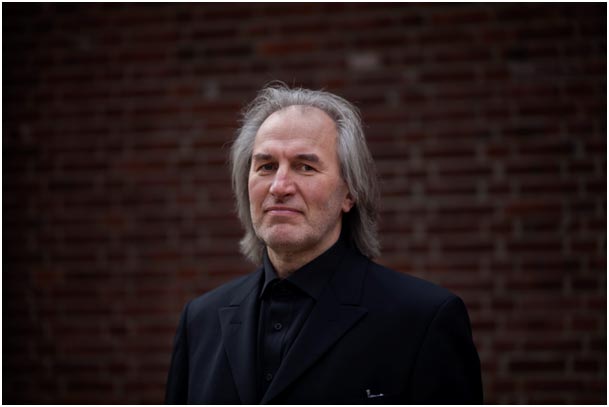Arvo Pärt Total Immersion, Barbican | reviews, news & interviews
Arvo Pärt Total Immersion, Barbican
Arvo Pärt Total Immersion, Barbican
The BBC Symphony Orchestra's day-long Pärt fest yields many riches

How incredibly heartening that this latest edition of the BBC Symphony Orchestra's Total Immersion, focusing on the music of the contemporary Estonian composer, Arvo Pärt, sold out days in advance.
The BBC Radio 3 producer who introduced the second of the day's three concerts (featuring the BBC Singers) made an especially astute observation about Pärt's music: “Simple on the page, but taxing to sing”. Unveiled in 1976 following his intensive study of early music, the basic unit of Pärt's 'tintinnabuli' style (tintinnabulum literally means 'small bell') consists of a stepwise melodic line accompanied by a triadic harmony. Scales and arpeggios - it sounds like child's play. But no. The fact that the music is so exposed, coupled with the constant sounding of the triad, means that the tiniest infidelity of pitch is disproportionately deleterious to the overall effect. Pärt's music really is unforgiving in that respect. The clear sounding, or ringing, of both the melodic and triadic voice (and the balance between them) is similarly key.
Performed by the Guildhall Consort and musicians from the Guildhall School of Music and Drama, it was fitting that the first music we heard in the opening afternoon concert was Pärt's Magnificat, one of the composer's most beloved choral works. Heard in the generous acoustic of St Giles' Cripplegate, whose famous parishioners have included William Shakespeare, Edward Alleyn and John Bunyan, this was beautifully balanced, with the choir - conducted by Eamonn Dougan – achieving a genuine pianissimo at the magical return to the hymn's opening line.
If the choir's technical command, flawless pitch and crystal clear articulation was impressive, it was their sensitivity to the text that took the breath away
Two brief instrumental pieces highlighted the inherent difficulties of playing Pärt's music. In Erdem Misirlioğlu's performance of the solo piano miniature Für Alina, the strict note-against-note counterpoint was broken when the triadic pitch at the end of one of the phrases failed to ring properly. Joined by violinist Pablo Hernan, Spiegel im Spiegel was taken just a shade too fast. The sense was less one of the numinous, more of someone having a train to catch. The soprano Jenavieve Moore was outstanding in the chamber work Stabat mater, sustaining her long notes with remarkably sure intonation and control. In keeping with its air of lamentation, the work's many silences were filled with the sound of rain beating down on the church's roof (the rain was incessant).
 Featuring the BBC Singers (pictured right) under their joint Principal Guest Conductor, Paul Brough, the 6pm concert (once again in St Giles' Cripplegate) presented Pärt interpretation at its best. If the choir's technical command, flawless pitch and crystal clear articulation was impressive, it was their sensitivity to the text that took the breath away. Unfailingly beautiful in tone - the resonant basses in the second movement, 'O Adonai', were terrific - their performance of the Seven Magnificat Antiphons was one of supreme focus. Pärt's first setting in English, The Beatitudes, was even better, with the choir delicately articulating the work's gradual harmonic ascent. Iain Farrington, who earlier gave a rapt performance of Trivium, provided the excellent organ accompaniment. In all of the works – Summa, Missa sillabica, ...which was the son of..., the choir gave a demonstration lesson in singing through the line, always providing a sense of forward momentum even at the slowest of tempos.
Featuring the BBC Singers (pictured right) under their joint Principal Guest Conductor, Paul Brough, the 6pm concert (once again in St Giles' Cripplegate) presented Pärt interpretation at its best. If the choir's technical command, flawless pitch and crystal clear articulation was impressive, it was their sensitivity to the text that took the breath away. Unfailingly beautiful in tone - the resonant basses in the second movement, 'O Adonai', were terrific - their performance of the Seven Magnificat Antiphons was one of supreme focus. Pärt's first setting in English, The Beatitudes, was even better, with the choir delicately articulating the work's gradual harmonic ascent. Iain Farrington, who earlier gave a rapt performance of Trivium, provided the excellent organ accompaniment. In all of the works – Summa, Missa sillabica, ...which was the son of..., the choir gave a demonstration lesson in singing through the line, always providing a sense of forward momentum even at the slowest of tempos.
And so to the evening concert, a mouth-watering programme that included two symphonies, a double violin concerto, a Mass and an orchestral vignette. Conducted by fellow Estonian, Tõnu Kaljuste (pictured below), the BBC Symphony Orchestra negotiated the crunching string clusters and pounding ostinatos of Symphony No. 1 with aplomb. Following Pärt's singular tribute to the Eiffel Tower, Silhouette, the orchestra gave a most persuasive performance of the transitional Symphony No. 3. The more you hear this work – with its overt references to the tropes of medieval and renaissance music - the more you perceive the simple, two-voice unit of the tintinnabuli style screaming to be let out.
 In the second half, the BBC SO strings were joined by the BBC Symphony Chorus for a nuanced reading of the Berliner Messe, in which the profound textural clearing of the Agnus Dei - and the sudden, heart-stopping shift to the major mode at the close - was movingly realised. The silence that greeted its conclusion was immediately broken when some buffoon's mobile phone went off. Can we not turn the things off for the duration of the concert? Please.
In the second half, the BBC SO strings were joined by the BBC Symphony Chorus for a nuanced reading of the Berliner Messe, in which the profound textural clearing of the Agnus Dei - and the sudden, heart-stopping shift to the major mode at the close - was movingly realised. The silence that greeted its conclusion was immediately broken when some buffoon's mobile phone went off. Can we not turn the things off for the duration of the concert? Please.
To conclude, one of the cornerstones of the tintinnabuli style: the double violin concerto Tabula rasa. Soloists Alina Ibragimova and Barnabás Kelemen gave one of the most energised and exciting performances of the first movement ('Ludus') I can recall. At times stamping on the floor for emphasis, crouching down like animals about to pounce and with bows flying in perfect sync, so locked together were Ibragimova and Kelemen in the busy, Vivaldi-like figurations that you couldn't blow smoke between them.
More than any other piece heard during a remarkable day, it was the expanding melodic arcs of the second movement, 'Silentium', that best captured the artistic credo of ECM, the label that introduced Pärt and Tabula rasa to the world with the launch of its New Series imprint in 1984: “The most beautiful sound next to silence”.
The three concerts will be broadcast this week on BBC Radio 3's 'Afternoon on 3' at 2pm (today, Wednesday and Friday respectively).
Watch an excerpt from 24 Preludes for a Fugue:
rating
Explore topics
Share this article
The future of Arts Journalism
You can stop theartsdesk.com closing!
We urgently need financing to survive. Our fundraising drive has thus far raised £49,000 but we need to reach £100,000 or we will be forced to close. Please contribute here: https://gofund.me/c3f6033d
And if you can forward this information to anyone who might assist, we’d be grateful.

Subscribe to theartsdesk.com
Thank you for continuing to read our work on theartsdesk.com. For unlimited access to every article in its entirety, including our archive of more than 15,000 pieces, we're asking for £5 per month or £40 per year. We feel it's a very good deal, and hope you do too.
To take a subscription now simply click here.
And if you're looking for that extra gift for a friend or family member, why not treat them to a theartsdesk.com gift subscription?
more Classical music
 Classical CDs: Voice flutes, flugelhorns and froth
Baroque sonatas, English orchestral music and an emotionally-charged vocal recital
Classical CDs: Voice flutes, flugelhorns and froth
Baroque sonatas, English orchestral music and an emotionally-charged vocal recital
 Kanneh-Mason, Britten Sinfonia, Shave, Milton Court - a grin and a big beaming smile
A pair of striking contemporary pieces alongside two old favourites
Kanneh-Mason, Britten Sinfonia, Shave, Milton Court - a grin and a big beaming smile
A pair of striking contemporary pieces alongside two old favourites
 theartsdesk at the New Ross Piano Festival - Finghin Collins’ musical rainbow
From revelatory Bach played with astounding maturity by a 22 year old to four-hand jazz
theartsdesk at the New Ross Piano Festival - Finghin Collins’ musical rainbow
From revelatory Bach played with astounding maturity by a 22 year old to four-hand jazz
 First Person: Manchester Camerata's Head of Artistic Planning Clara Marshall Cawley on questioning the status quo
Five days of free events with all sorts of audiences around Manchester starts tomorrow
First Person: Manchester Camerata's Head of Artistic Planning Clara Marshall Cawley on questioning the status quo
Five days of free events with all sorts of audiences around Manchester starts tomorrow
 Goldscheider, Brother Tree Sound, Kings Place review - music of hope from a young composer
Unusual combination of horn, strings and electronics makes for some intriguing listening
Goldscheider, Brother Tree Sound, Kings Place review - music of hope from a young composer
Unusual combination of horn, strings and electronics makes for some intriguing listening
 theartsdesk Q&A: composer Donghoon Shin on his new concerto for pianist Seong-Jin Cho
Classical music makes its debut at London's K-Music Festival
theartsdesk Q&A: composer Donghoon Shin on his new concerto for pianist Seong-Jin Cho
Classical music makes its debut at London's K-Music Festival
 Helleur-Simcock, Hallé, Wong, Bridgewater Hall, Manchester review - moving lyricism in Elgar’s concerto
Season opener brings lyrical beauty, crisp confidence and a proper Romantic wallow
Helleur-Simcock, Hallé, Wong, Bridgewater Hall, Manchester review - moving lyricism in Elgar’s concerto
Season opener brings lyrical beauty, crisp confidence and a proper Romantic wallow
 Kohout, Spence, Braun, Manchester Camerata, Huth, RNCM, Manchester review - joy, insight, imagination and unanimity
Celebration of the past with stars of the future at the Royal Northern College
Kohout, Spence, Braun, Manchester Camerata, Huth, RNCM, Manchester review - joy, insight, imagination and unanimity
Celebration of the past with stars of the future at the Royal Northern College
 Jansen, LSO, Pappano, Barbican review - profound and bracing emotional workouts
Great soloist, conductor and orchestra take Britten and Shostakovich to the edge
Jansen, LSO, Pappano, Barbican review - profound and bracing emotional workouts
Great soloist, conductor and orchestra take Britten and Shostakovich to the edge
 Jakub Hrůša and Friends in Concert, Royal Opera review - fleshcreep in two uneven halves
Bartók kept short, and a sprawling Dvořák choral ballad done as well as it could be
Jakub Hrůša and Friends in Concert, Royal Opera review - fleshcreep in two uneven halves
Bartók kept short, and a sprawling Dvořák choral ballad done as well as it could be

Add comment